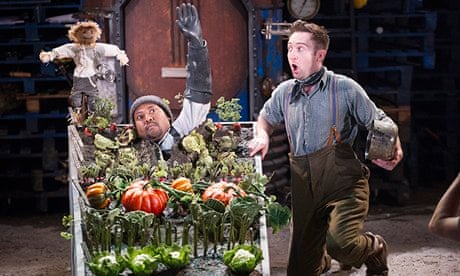"I wish I could sing like that, papa." For my four-year-old daughter's first trip to the opera, this was a result. Or would've been, had the favoured voice not belonged to a busker whose fine rendition of Tosca's Vissi d'Arte occupied us before we headed to Julian Philips and Edward Kemp's new opera, How the Whale Became. Puccini's luxuriating lyricism, though, has little place in the musical world of Philips, who feels modern musical idioms are as good for children as adults. He's been proved right in the past, and thanks to his wonderfully assured ear, the new work's fascinating, eclectic score is its least challenging aspect.
Kemp, Philips and stage director Natalie Abrahami have turned Ted Hughes's creation tales into an inventive experiment in live theatre. Tom Scutt's charmingly cluttered set of blue pallets stacked with miniature cottages and sprouting plants serves as God's workshop – half allotment shed, half Flash Gordon spaceship. As in the stories, God, played by different members of the cast, is a somewhat hazy, inconsequential figure whose loving but haphazard messings-about-with-clay are left to themselves to discover who they are.
Like the animals, the opera also "becomes" during the performance. This involves the on-stage musicians using different versions of the same instrument (the pianist moves between a toy piano, broken pub piano and a Steinway), echoing the characters' experimentation with different versions of themselves. By the end, the musical, dramatic and emotional elements have coalesced into something in which operatic modes of expression seem perfectly natural. It's a fascinating recipe both for adult and children's music-theatre, but (on opening night at least) there's some way to go before the first half can escape the encroaching sense of shapelessness. As my daughter told the librettist afterwards: "It was very good, but you need to tidy up now."

Comments (…)
Sign in or create your Guardian account to join the discussion